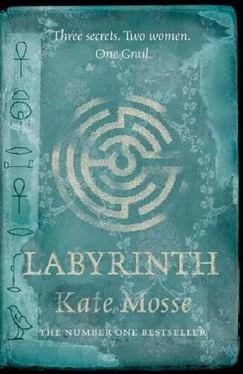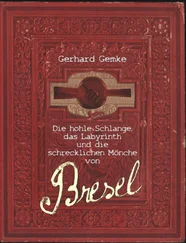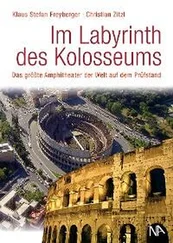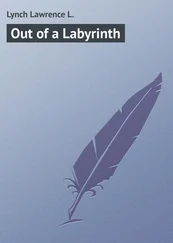Pelletier headed back inside, holding the letter tight to his chest. He registered no one as he swept through the corridor leading to his chamber.
The door was locked. Cursing his own caution, Pelletier fumbled with the keys, his haste making him clumsy. Francois had lit the calelhs, the oil lamps, and set his night tray with a jug of wine and two earthenware goblets on the table in the center of the room, as he did every night. The highly polished brass surface of the tray gleamed in the flickering golden light.
Pelletier poured himself a drink to steady his nerves, his head full of dusty images, memories of the Holy Land and the long, red shadows of the desert. Of the three books and the ancient secret contained within their pages.
The coarse wine was sour on his tongue and hit the back of this throat with a sting. He downed it in one, then refilled the goblet. Many times he’d tried to visualize how he would feel at this moment. Yet now it had finally come, he felt numb.
Pelletier sat down, placing the letter on the table between his outstretched hands. He knew what it said. It was the message he’d been both anticipating and dreading for many years, ever since he’d arrived in Carcassonne. In those days, the prosperous and tolerant lands of the Midi had seemed a safe hiding place.
As the seasons rolled one into the next, over time Pelletier’s expectations of being called upon diminished. Day-to-day life took over. Thoughts of the books faded from his mind. In the end, he had almost forgotten that he was waiting at all.
More than twenty years had passed since he’d last set eyes upon the author of the letter. Until this moment, he realized, he’d not even known if his teacher and mentor was still alive. It was Harif who had taught him to read in the shade of the olive groves on the hills outside Jerusalem. It was Harif who’d opened his senses to a world more glorious, more magnificent than anything Pelletier had ever known. It was Harif who’d taught him to see that Saracens, Jews and Christians were following but different paths to the one God. And it was Harif who’d revealed to him that beyond all that was known lay a truth far older, more ancient, more absolute than anything the modern world had to offer.
The night of Pelletier’s initiation into the Noublesso de los Seres was as sharp and clear in his mind as if it was yesterday. The shimmering robes of gold and the bleached white altar cloth, as dazzling as the forts that glinted high on the hills above Aleppo among the cypress trees and orange groves. The smell of the incense, the rise and fall of the voices whispering in the darkness. Illumination.
That night, another lifetime ago, or so it seemed to Pelletier now, was when he had looked into the heart of the labyrinth and made a vow to protect the secret with his life.
He pulled the candle closer. Even without the authenticity of the seal, there could be no doubt that the letter was from Harif. He would recognize his hand anywhere, the distinctive elegance of his letters and the exact proportions of his script.
Pelletier shook his head, trying to dislodge the memories threatening to overwhelm him. He took a deep breath, then slipped his knife under the seal. The wax split open with a soft crack. He smoothed the parchment flat.
The letter was brief. Across the top of the sheet were the symbols Pelletier remembered from the yellow walls of the labyrinth cave in the hills outside the Holy City. Written in the ancient language of Harif’s ancestors, they meant nothing except to those initiated into the Noublesso.
Pelletier read the words aloud, the familiar sounds reassuring him, before turning to Harif’s letter.
Fraire
It is time. Darkness is coming to these lands. There is malice in the air, an evil that will destroy and corrupt all that is good. The texts are no longer safe in the plains of the Pays d’Oc. It is time for the Trilogy to be reunited. Your brother awaits you in Besiers, your sister in Carcassona. It falls to you to carry the books to a place of greater safety.
Make haste. The summer passes to Navarre will be closed by Toussaint, perhaps sooner if the snows come early. I shall expect you by the Feast Day of Sant-Miquel.
Pas a pas, se va luenh.
The chair creaked as Pelletier leaned sharply back. It was no more than he expected. Harif’s instructions were clear. He asked no more than Pelletier had once sworn to give. But yet, he felt as if his soul had been sucked out of his body leaving only a hollow space.
The pledge he had given to guard the books had been made willingly, but in the simplicity of youth. Now, at the end of his middle years, it was more complicated. He had fashioned a different life for himself in Carcassonne. He had other allegiances, others he loved and served.
Only now did he realize how completely he’d persuaded himself that the moment of reckoning would not come in his lifetime. That he would never be forced to choose between his loyalty and responsibility to Viscount Trencavel and his obligation to the Noublesso.
No man could serve two masters with honor. If he did as Harif commanded, it would mean abandoning the viscount at the hour of his greatest need. Yet every moment he stayed at Raymond-Roger’s side, he would be failing in his duty to the Noublesso.
Pelletier read the letter again, praying for a solution to present itself. This time, certain words, certain phrases stood out: “Your brother awaits you in Besiers.”
Harif could only mean Simeon. But in Beziers? Pelletier lifted the goblet to his lips and drank, tasting nothing. How strange that Simeon had come so forcefully into his mind today, after many years of absence.
A twist of fate? Coincidence? Pelletier believed in neither. Yet how to account for the dread that had swept through him when Alais had described the body of the man lying murdered in the waters of the Aude? There was no reason to imagine it would be Simeon, yet he’d been so certain.
And this: “ your sister in Carcassona .”
Puzzled, Pelletier traced a pattern in the light surface of dust on the wooden table with his finger. A labyrinth.
Could Harif have appointed a woman as a guardian? Had she been here in Carcassonne, under his nose, all this time? He shook his head. It could not be.
Alais stood at her window, waiting for Guilhem to return. The sky over Carcassonne was a deep, velvet blue, casting a soft mantle over the land. The dry, evening wind from the north, the Cers, was blowing gently down from the mountains, rustling the leaves on the trees and the reeds on the banks of the Aude, bringing the promise of fresher air along with it.
There were pinpricks of light shining in Sant-Miquel and Sant-Vicens. The cobbled streets of the Cite itself were alive with people eating and drinking, telling stories and singing songs of love and valor and loss. Around the corner from the main square, the fires of the blacksmith’s forge still burned.
Waiting. Always waiting.
Alais had rubbed her teeth with herbs to make them whiter and basted a small sachet of forget-me-nots into the neck of her dress for perfume. The chamber was filled with a sweet aroma of burning lavender.
The Council had ended some time ago and Alais had expected Guilhem to come or at least to send word to her. Fragments of conversation drifted up from the courtyard below like wisps of smoke. She caught a glimpse of her sister Oriane’s husband, Jehan Congost, as he scuttled across the courtyard. She counted seven or eight chevaliers of the household and their ecuyers, rushing purposefully to the forge. Earlier, she’d noticed her father reprimanding a young boy who had been hanging around the chapel.
Читать дальше












